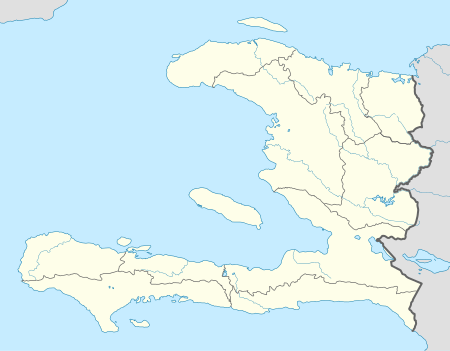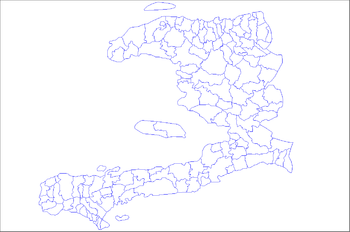Pétion-Ville
Pétion-Ville is a commune and a suburb of Port-au-Prince, Haiti, in the hills east and separate from the city itself on the northern hills of the Massif de la Selle. Founded in 1831 by then president Jean-Pierre Boyer, it was named after Alexandre Sabès Pétion (1770–1818), the Haitian general and president later recognized as one of the country's four founding fathers. The district is primarily a residential and touristic area. It held a population of 283,052 at the 2003 Census, which was officially estimated to have reached 376,834 in 2015.[1] Many diplomats, foreign businessmen, and wealthy citizens do business and reside in Pétion-Ville.[2]
Pétion-Ville | |
|---|---|
 Pétion-Ville Location in Haiti | |
| Coordinates: 18°31′0″N 72°17′0″W | |
| Country | |
| Department | Ouest |
| Arrondissement | Port-au-Prince |
| Area | |
| • Total | 63.90 sq mi (165.49 km2) |
| Population (2015 Est.)[1] | |
| • Total | 376,834 |
| • Density | 5,900/sq mi (2,277/km2) |
Despite the distance from the capital and the general affluence of the district, the lack of administrative enforcement has led to the formation of shantytowns on the outer edges of the district, as poor locals migrate upward and have settled there in search of job opportunities.
Culture and nightlife
The gated and privately guarded neighborhoods of Pétion-Ville resemble a Haitian version of Beverly Hills, but with barbed wire. The community is very stable, with nightlife and business conducted with an appearance of western normality, in striking contrast to many other parts of greater Port-au-Prince.
The hillside suburban town is filled with nightclubs, beauty salons, fitness gyms and restaurants. Businesses which cater to tourists are commonplace, and parties and get-togethers often take place at night. Establishments often host considerable expatriates and foreigners of a similar calibre.
The "El Rancho" hotel is in Pétion-Ville. It was built from the private estate of Albert Silvera, a sports and luxury car collector who was one of the pioneers of Haiti's hotel industry.
2010 earthquake
On 12 January 2010, around 5:53pm, a 7.0 earthquake struck the Pétion-Ville area. The earthquake caused the collapse of a hospital in the city.[3] The 7.0-magnitude earthquake destroyed many buildings in Port-au-Prince, and a lot of homes in the Montana area including the Hôtel Montana.
The Club de Pétion-Ville golf course was converted into a tent city by the US Army and housed 50,000 to 80,000 Haitians in 2010.[4] Its tennis courts host the US 82nd Airborne.[5] The club was built in the 1930s and had only around 300 members at the time.[6] The golf clubhouse has been turned into a field hospital.[7]
In early February 2010, the Israeli-based humanitarian organization, IsraAid, opened a child education center in the Pétion-Ville tent city, in conjunction with other agencies, such as Operation Blessing. The center was set up initially in the tents from the IDF’s field hospital.[8]
The "Muncheez" pizza restaurant was turned into a community soup kitchen. It served approximately 1,000 free meals a day. Before the quake, the restaurant chain was a place where few even in Pétion-Ville could afford to eat. After the quake, owners realized that the food stored at the three restaurants would spoil before it would get back into business and decided to give it all away. Although still living in the streets, the cooks still came to cook for the masses. Owners distributed blue bracelets throughout Pétion-Ville, one bracelet for one meal. They selected one of the outlets to become the soup kitchen and moved all 105 employees to that site to cook. When food ran out after two days, the Hôtel Montana donated what could be salvaged from their freezers. When they began running out of fuel, cooking oil and food, a convoy from relatives of the owners in the Dominican Republic arrived, funded by donations with more food and fuel. USAID supplied fuel, cooking oil and food to cook, and World Vision supplied bulgur and lentils.[9][10][11]
Electricity was restored to some sectors at the beginning of February[12] and to most of the rest of the city later.
There have been a number of developments in the region. One such notable one was the development of The Irish village, which incorporated an Irish pub, called The Irish Embassy. This pub is frequented by many of the affluent members of the Haitian population including members of government.
Facilities
The Club de Pétion-Ville country club was built in the 1930s and has Haiti's only golf course, a nine-hole course.[6] It also contains tennis courts and swimming pools.[7] The "Club de Pétion-Ville" is not in the suburb of Pétion-Ville but is located in the northwest of the foothills.
See also
- Cabane Choucoune, famous cabaret and thatch-roofed dance club
- Don Bosco FC, a professional football club
- Festival du Rhum Haiti, annual international festival
- Signal FM, a radio station
References
- "Mars 2015 Population Totale, Population de 18 Ans et Plus Menages et Densites Estimes en 2015" (PDF). Institut Haïtien de Statistique et d’Informatique (IHSI). Archived from the original (PDF) on 6 November 2015. Retrieved 19 February 2015.
- Katz, Jonathan (2010-01-13). "Major quake hits Haiti; many casualties expected". AP. Archived from the original on January 14, 2010. Retrieved 2010-01-13.
- "Haitian Earthquake Causes Hospital Collapse". The New York Times. 12 January 2010. Archived from the original on 13 January 2010. Retrieved 12 January 2010.
- Ireland On-Line, "Aid agencies overhaul food distribution in Haiti", 30 January 2010 (accessed 31 January 2010)
- Boston Globe, The field hospital at the club was operated by NDMS teams from the US Department of Health and Human Services. "Much rests on Haiti elite", Maria Sacchetti, 31 January 2010 (accessed 31 January 2010)
- Golf.com, "Once a club with 300 members, Haiti's lone golf course is now a refugee camp" Archived January 23, 2010, at the Wayback Machine, Farrell Evans, 20 January 2010 (accessed 31 January 2010)
- National Post, "This won't do any good for most people", Sheldon Alberts, 23 January 2010 (accessed 31 January 2010)
- Heyman, Jeffrey "The resilience of the people is stronger than we expected", (10 February 2010), in Israel 21c Innovation News Service, Retrieved 2010-02-11
- NPR, "Haitian Eatery Serves Up Taste Of Hope Amid Despair", Tamara Keith, 27 January 2010 (accessed 31 January 2010)
- IOL, "Quake survivors score meals from pizza place", Ruth Morris, 28 January 2010 (accessed 31 January 2010)
- Christian Science Monitor, "Haiti earthquake: Restaurateur turns Port-au-Prince eatery into soup kitchen", Howard LaFranchi, 24 January 2010 (accessed 31 January 2010)
- Haiti Press Network, "Haïti – Séisme : L’électricité se rétablit peu à peu" Archived February 9, 2010, at the Wayback Machine, MJB, 4 February 2010 (accessed 5 February 2010)
External links

- Reuters, "Pétion-Ville atlas of building damage assessment", 2 March 2010
